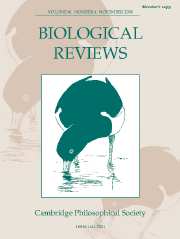Crossref Citations
This article has been cited by the following publications. This list is generated based on data provided by
Crossref.
Hays, Graeme C.
2003.
Migrations and Dispersal of Marine Organisms.
p.
163.
Hays, Graeme C.
2003.
A review of the adaptive significance and ecosystem consequences of zooplankton diel vertical migrations.
Hydrobiologia,
Vol. 503,
Issue. 1-3,
p.
163.
Leis, Jeffrey M.
2004.
Vertical distribution behaviour and its spatial variation in late-stage larvae of coral-reef fishes during the day.
Marine and Freshwater Behaviour and Physiology,
Vol. 37,
Issue. 2,
p.
65.
Robinson, Carlos J.
and
Gomez-Aguirre, Samuel
2004.
Tidal stream use by the red crab Pleuroncodes planipes in Bahı́a Magdalena, Mexico.
Journal of Experimental Marine Biology and Ecology,
Vol. 308,
Issue. 2,
p.
237.
Leising, Andrew W.
Pierson, James J.
Cary, Scott
and
Frost, Bruce W.
2005.
Copepod foraging and predation risk within the surface layer during night-time feeding forays.
Journal of Plankton Research,
Vol. 27,
Issue. 10,
p.
987.
FIKSEN, ØYVIND
ELIASSEN, SIGRUNN
and
TITELMAN, JOSEFIN
2005.
Multiple predators in the pelagic: modelling behavioural cascades.
Journal of Animal Ecology,
Vol. 74,
Issue. 3,
p.
423.
Halsband-Lenk, Claudia
2005.
Metridia pacifica in Dabob Bay, Washington: The diatom effect and the discrepancy between high abundance and low egg production rates.
Progress in Oceanography,
Vol. 67,
Issue. 3-4,
p.
422.
Cohen, J. H.
and
Forward, R. B.
2005.
Diel vertical migration of the marine copepod Calanopia americana. II. Proximate role of exogenous light cues and endogenous rhythms.
Marine Biology,
Vol. 147,
Issue. 2,
p.
399.
Pierson, James J.
Leising, Andrew W.
Halsband-Lenk, Claudia
and
Ferm, Nissa
2005.
Vertical distribution and abundance of Calanus pacificus and Pseudocalanus newmani in relation to chlorophyll a concentrations in Dabob Bay, Washington.
Progress in Oceanography,
Vol. 67,
Issue. 3-4,
p.
349.
Cohen, J. H.
and
Forward, R. B.
2005.
Diel vertical migration of the marine copepod Calanopia americana. I. Twilight DVM and its relationship to the diel light cycle.
Marine Biology,
Vol. 147,
Issue. 2,
p.
387.
Swadling, Kerrie M.
2006.
Krill Migration: Up and Down All Night.
Current Biology,
Vol. 16,
Issue. 5,
p.
R173.
Leis, Jeffrey M.
2006.
Advances in Marine Biology Volume 51.
Vol. 51,
Issue. ,
p.
57.
Liu, Shun-Hui
Sun, Song
and
Han, Bo-Ping
2006.
Viewing DVM via general behaviors of zooplankton: A way bridging the success of individual and population.
Journal of Theoretical Biology,
Vol. 238,
Issue. 2,
p.
435.
Santos, A. Miguel P.
Ré, Pedro
dos Santos, Antonina
and
Peliz, Álvaro
2006.
Vertical distribution of the European sardine (Sardina pilchardus) larvae and its implications for their survival.
Journal of Plankton Research,
Vol. 28,
Issue. 5,
p.
523.
Bradbury, I R
Gardiner, K
Snelgrove, P VR
Campana, S E
Bentzen, P
and
Guan, L
2006.
Larval transport, vertical distribution, and localized recruitment in anadromous rainbow smelt (Osmerus mordax).
Canadian Journal of Fisheries and Aquatic Sciences,
Vol. 63,
Issue. 12,
p.
2822.
Pinel-Alloul, Bernadette
and
Ghadouani, Anas
2007.
The Spatial Distribution of Microbes in the Environment.
p.
203.
Bezerra-Neto, José Fernandes
and
Pinto-Coelho, Ricardo Motta
2007.
Diel vertical migration of the copepod Thermocyclops inversus (Kiefer, 1936) in a tropical reservoir: the role of oxygen and the spatial overlap with Chaoborus.
Aquatic Ecology,
Vol. 41,
Issue. 4,
p.
535.
Sourisseau, M
Simard, Y
and
Saucier, F J
2008.
Krill diel vertical migration fine dynamics, nocturnal overturns, and their roles for aggregation in stratified flows.
Canadian Journal of Fisheries and Aquatic Sciences,
Vol. 65,
Issue. 4,
p.
574.
Morozov, Andrew
Arashkevich, Elena
Reigstad, Marit
and
Falk-Petersen, Stig
2008.
Influence of spatial heterogeneity on the type of zooplankton functional response: A study based on field observations.
Deep Sea Research Part II: Topical Studies in Oceanography,
Vol. 55,
Issue. 20-21,
p.
2285.
GÉLINAS, MALORIE
and
PINEL‐ALLOUL, BERNADETTE
2008.
Summer depth selection in crustacean zooplankton in nutrient‐poor boreal lakes is affected by recent residential development.
Freshwater Biology,
Vol. 53,
Issue. 12,
p.
2438.

